|
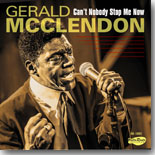 Another month of Blues Bytes,
and here we are with still another discovery of a
fabulous performer of whom I was previously
aware. These types of discoveries provide the biggest adrenaline high I get
from publishing this website every month. Along
comes Gerald McClendon, a veteran of the
Chicago blues, soul and R&B scene for over 20
years but with few recordings to his credit. Another month of Blues Bytes,
and here we are with still another discovery of a
fabulous performer of whom I was previously
aware. These types of discoveries provide the biggest adrenaline high I get
from publishing this website every month. Along
comes Gerald McClendon, a veteran of the
Chicago blues, soul and R&B scene for over 20
years but with few recordings to his credit.
Let's hope that the release of the
very fine Can't Nobody Stop Me Now (Delta
Roots Records) gives Mr. McClendon the recognition
he needs to make regular trips into the recording
studio, as well as getting the man out on tour
once this pandemic is under control. It's a
collection of 12 original songs from the pen of producer Twist
Turner, showcasing McClendon's elite vocals backed
by a crack band of Chicago regulars.
McClendon nicely straddles that fence between soul
and blues, leaning more to the soul side, and that's
quite alright with me because I really like both
genres not to mention the fact that the man has the
vocal chops to handle just about any style of music.
The band is quite outstanding, too,
especially the horn section with Skinny Williams
shining on tenor sax throughout the session.
The brass section leads off the
opening soulful cut, "Can't Nobody Stop Me Now,"
before McClendon's sweet voice that fits in
quite fine in the Tyrone Davis mold. Williams comes
in with the first of many wonderful sax solos, and
then leads off the next cut, "Where Do We Go From
Here," with smooth jazzy playing on this slower,
soulful number. McClendon is begging his woman for
her forgiveness after he catches him in the act with
another woman.
McClendon slows the tempo on the
next two cuts, the mid-tempo soul/blues tune "Groove
On Tonight," on which he boastfully announces that
he's ready for a night of love, followed by the slow blues "She Don't
Love Me Anymore," lamenting that his woman has
thrown him out. The tables are turned on the
mid-tempo blues, "Runnin' Wild," with his baby
running around on him. Williams contributes another
very nice sax solo to go with the entire horn
section constructing a wall of sound.
The liner notes list three guitar
players and three piano players backing McClendon on
the album, so it's hard to identify who's who on any particular
cut, but the slow. soulful ballad, "It's Over Now"
features really nice keyboard and fretwork throughout the
song. Williams is at it again with the intro to the
pleasant soul song, "Mr. Wrong," with McClendon
wooing a woman by offering, "...Can I be Mr. Wrong
tonight, 'til Mr. Right comes along?..."
"I Started Over" is McClendon's song
of redemption, a thoughtful soul/blues number on
which he packs even more emotion and range into his
voice. He follows that will a slow, soulful tune,
"You Can't Take My Love," with very nice piano from
one of the three keyboardists at the session.
McClendon gives his vocals even more power
on another slow soul song, "Why Can't We Be
Together," with Williams once again the highlight
with his beautiful sax playing.
On the more funky "Cut You Once," McClendon gets a
little over-confident with himself as he brags about
his love affairs until he gets caught by his wife,
who tells him, "...I'm going to cut you once, shoot
you twice, you better start running for your life
..." The mood changes completely on the closing
number, "I Think About You," a strong testimonial to
the love of his woman.
Let's hope that the title of this
exquisite album --- Can't Nobody Stop Me Now
--- is a prediction of what's going to happen with
McClendon's career moving forward. I can't stop
listening to it, and neither should you.
--- Bill Mitchell
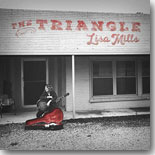 Lisa Mills has quite the voice, capable of
belting out the big sound of soulful blues, as
heard on The Triangle. With several previous
albums to her credit, but none recently, The
Triangle is the first effort from the Melody
Place Music
label. For the 14 songs on this CD, Mills, along
with producer Fred Mollin, traveled around the
south to legendary studios, making jaunts to the
Fame Studios in Muscle Shoals, Alabama, Royal
Studios in Memphis, Malaco Studios in Jackson,
Mississippi, and finally back to Memphis for one
song at the Sun Studios. Lisa Mills has quite the voice, capable of
belting out the big sound of soulful blues, as
heard on The Triangle. With several previous
albums to her credit, but none recently, The
Triangle is the first effort from the Melody
Place Music
label. For the 14 songs on this CD, Mills, along
with producer Fred Mollin, traveled around the
south to legendary studios, making jaunts to the
Fame Studios in Muscle Shoals, Alabama, Royal
Studios in Memphis, Malaco Studios in Jackson,
Mississippi, and finally back to Memphis for one
song at the Sun Studios.
The
Muscle Shoals sessions produced the first single
from the album, a cover of Little Richard's
"Greenwood, Mississippi," with Mills' voice
soaring above a beat that is somewhat
reminiscent of Credence Clearwater. Other soul
classics from this session are a couple of Etta
James numbers, "Tell Mama" and "I'd Rather Go
Blind," and a version of Clarence Carter's "Slip
Away." The Etta songs both start out
sounding very similar to the original versions
before Ms. Mills and the band take the songs
into a different direction. She's got a voice
that has the same power as that of Etta, but
with a touch more grit. Her rendition of "Slip
Away" is very nice, with solid B3 accompaniment
from Clayton Ivey.
I
really got into the five songs recorded in
Memphis, especially with the crack backing band
joining Mills in the Royal facility (Lester
Snell - keyboards, Leroy Hodges - bass, Michael
Toles - lead guitar, Fred Mollin - rhythm
guitar, Steve Potts - drums and Reverend Charles
Hodges - Hammond B3). Now that's a hot, hot
band!
Toles turns in a killer guitar solo on "That's
What Love Will Make You Do," a song that was
done by both Little Milton and Aretha Franklin
back in the day. The horn section of Jim Hoke
and Steve Herman provides a big soul sound on
Bobby Womack's "I'm In Love," and the slow-paced
Mable John ballad, written by Isaac Hayes and
David Porter, just plain drips with
gospel-influenced Memphis soul.
The
feelgood Sam & Dave classic, "A Place Nobody Can
Find," has a shuffle beat with a girl group
sound that is well-suited for Mills' voice,
before the star of our show puts her feelings on
the line with Otis Redding's "That's How Strong
My Love Is."
If I
get a vote, I believe that Mills should record
the entirety of her next album at the Royals Studios with
the same backing musicians --- that one would be
a sure-fire winner.
Not
that there's anything wrong with what came out
of the other studios. The four cuts from the
Malaco Studios include two oft-covered classics,
Bobby Bland's "Members Only" and "Someone Else
Is Stepping In," the latter recorded for Malaco by both Z.Z.
Hill and Denise LaSalle.
Closing the album is the lone number recorded at
Sun, a restrained version of The Prisonaires'
"Just Walking In The Rain," a beautiful number
with the primary accompaniment being guitar
strumming by Mills.
Ms.
Mills is incredibly talented with a good future
ahead of her. I really like this album and
highly recommend it. What I'd like to see in
her choice of covers for future albums is to go
deeper into other artists' catalogs, as most of
the songs here are standard numbers that we've
heard countless times from both the original
performers as well as other singers covering the
same songs. But I get it because what she was trying to
accomplish with this album was to record these
classics in the same studios and with many of
the same session musicians. I'll be looking
forward to what Mills has planned next time
around, as I stated above I'm hoping that she
pays another visit to the Royal Studios real
soon.
--- Bill Mitchell
 I've
read numerous reviews of previous albums by
Reverend Freakchild, but getting a promo
copy of his newest disc, The Bodhisattva Blues
(Treated and Released Records), his 12th
overall, was my first chance to hear what this
crazy dude is all about. The Reverend normally
performs solo, but for this album he assembled a
cast of thousands to back him (well, not really,
but there are upwards of 20 names listed in the
liner notes). I've
read numerous reviews of previous albums by
Reverend Freakchild, but getting a promo
copy of his newest disc, The Bodhisattva Blues
(Treated and Released Records), his 12th
overall, was my first chance to hear what this
crazy dude is all about. The Reverend normally
performs solo, but for this album he assembled a
cast of thousands to back him (well, not really,
but there are upwards of 20 names listed in the
liner notes).
After two times through the album, I'm still not
sure where I stand on his music other than to
say that the Rev is pretty far out there and I
applaud his creativity. For me, sometimes it
works and sometimes it doesn't. Most important
point to understand is that his voice is an
acquired taste, and it's not one that has grown
on me yet. There's definitely a Grateful Dead
vibe on this album, with various backing
musicians that have connections to Jerry Garcia
and other Dead alumni.
What
intrigues and entertains me the most on The Bodhisattva Blues
are the covers of a pair of songs that are
normally outside the boundaries of the blues
genre, especially the very nice version of
Garcia's "Friend of the Devil." The Reverend's
voice is much more restrained here and the
backing accompaniment is sparser than on other
cuts, highlighted by Mark Karan's wonderfully
tasteful guitar picking and Chris Parker's
subtle use of brushes on the drums. Jerry Garcia
must be smiling every time this version gets
played.
The
other cover that really gets me off is a quirky,
totally-redone version of John Lennon's
"Imagine," built around the smooth R&B bass
lines of Phil Martino and jazzy guitar licks
from Alex the Dragon (yeah, that's what the
liner notes give as the man's name). Rev's voice
is so much more pleasant here as he doesn't try
to out-do the instrumentalists.
"Sweet Sweet You," with a prevailing Grateful
Dead vibe, is the only Freakchild original and
which he recorded on a previous album, a tribute
to influential musicians who we've lost over the
years. Ironically, what stands out most about
this song is the lap steel work from legendary
rock bassist Drew Glackin, who passed away in
2008 (I've been poring through the liner notes
and google searches trying to figure out the
timeline on this one). Also worth hearing is the
primal raw blues/gospel of Rev. Gary Davis'
"Death Don't Have No Mercy," made special by the
eerie sound of Jay Collins'
Bansuri flute.
Organ player Melvin Seals is kind of a big name
with the still active Jerry Garcia Band, and he
makes three appearances on The Bodhisattva Blues.
I especially like his work on the re-imagining
of Jimmy Reed's "Big Boss Man," on which the
Reverend's voice comes across better for my
ears. An added bonus here is the very fine lap
steel and harmonica playing by Hugh Pool. Also
interesting is the cover of a traditional tune,
"I Know You Rider," that was once covered by Hot
Tuna, with slide guitar from A.J. Fullerton
taking this one over the top.
The Bodhisattva Blues
is growing on me now that I've gotten through it
two full times. It's not an album that I'm going
to listen to repeatedly, but there are favorite
songs that I will have on shuffle and repeat.
--- Bill Mitchell
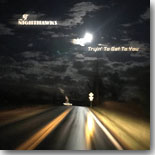 As a
young man having just moved to the big city,
Washington, D.C., in 1976, I
knew very little about the blues back then.
Before long I was regularly going out to see
this relatively young blues band called The
Nighthawks. The 1970s era lineup (Mark Wenner,
Jimmy Thackery, Pete Ragusa, Jan Zukowski)
gave me my earliest lessons in the
blues. The Nighthawks are
still around, although Wenner has been the only
original member still in the band for quite some time.
Coming up on 50 years of existence, these guys
show no signs of slowing down, releasing another
fine new album, Tryin' To Get To You
(Eller Soul Records). As a
young man having just moved to the big city,
Washington, D.C., in 1976, I
knew very little about the blues back then.
Before long I was regularly going out to see
this relatively young blues band called The
Nighthawks. The 1970s era lineup (Mark Wenner,
Jimmy Thackery, Pete Ragusa, Jan Zukowski)
gave me my earliest lessons in the
blues. The Nighthawks are
still around, although Wenner has been the only
original member still in the band for quite some time.
Coming up on 50 years of existence, these guys
show no signs of slowing down, releasing another
fine new album, Tryin' To Get To You
(Eller Soul Records).
In
addition to the venerable Wenner, The Nighthawks
now consist of the solid ensemble of Dan Hovey
(guitars), Mark Stutso (drums) and Paul Pisciotta (bass).
Typical for a 'Hawks release, the material is
all over the place, covering a variety of styles
in a familiarly refreshing way over the 13-song
disc of both originals and well-chosen covers.
Two
of the better cuts were also recorded by The
Nighthawks on the 1990 release, Trouble,
when the band consisted of the early lineup
(minus Thackery) but bolstered by a pair of
relative youngsters from North Carolina, Danny
Morris on guitar and Mike Cowan on keyboards.
One of these remakes is the title cut, an Elvis
Presley number with Wenner on vocals and Hovey
playing Hawaiian-style guitar chords that
surprisingly fits quite well here. In fact, I
had to search online to make sure that Elvis
hadn't sung this same song on his Blue Hawaii
film; I'm sure the King would have worked it in
had he heard Hovey's playing on this cover. Also
being repeated from Trouble is James
Brown's "Tell Me What I Did Wrong," with the
high point on this number being Wenner's
energetic harmonica solo.
Wenner is also featured on the opening number, a
cover of Jimmy Reed's "Come Love." In addition
to perfectly replicating Reed's harmonica style,
Wenner shouts out staccato vocal lines on this
lazy blues shuffle. Switching formats on the
next cut, the band tackles T-Bone Walker's "I
Know Your Wig Is Gone," with Hovey providing the
appropriate jazzy swing sound on guitar while
Wenner sends a bit of echo through his
harmonica.
Hovey handles the vocals on Hank Ballard's "Rain
Down Tears," slowed down to a dirge-like tempo
with the rest of the band chiming in with
background vocals just like the Midnighters did
so many years ago. The tempo picks up on a
version of the Manhattans' "Somethin' Is Cookin',"
with Stutso handling the vocals. Wenner then does his best
harmonica work on a cover of Los Lobos' "Don't
Worry Baby," also giving Hovey a chance to show
off on guitar.
As
for original compositions, I like the closing
number, "The Cheap Stuff," a subtle country
blues number written by Hovey who plays nice
acoustic guitar. It's a nice finish to an
extremely versatile album.
If
by chance you are new to the The Nighthawks and
looking to get up to speed on this very
influential band,
better to start by listening to some of
their early classic stuff. Open All Nite,
Live At Pysche Delly, and Rock 'n' Roll
are all still available, as well as the two
Jacks & Kings albums that they did with
members of the Muddy Waters Band. But for a good
look at what these cats are doing many, many
years later, Tryin' To Get To You is
certainly worth the listen.
--- Bill Mitchell
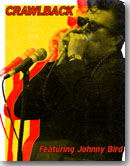 Crawlback (Call My Job Records) is both the
name of this debut album and the band led by
South Wales born blues singer, harp player and
guitarist Johnny Bird. The explosion of
UK blues harp talent started in the 1950s and
60s with Cyril Davies and continued for the rest
of the century, epitomized by the British Blues
Awards Hall Of Fame inductee Paul Lamb. This
decade has been dominated by the younger
generation, notably Memphis Blues Music Award
Winner and Alligator recording artist Giles
Robson plus a plethora of innovative performers
including Will Wilde. Crawlback (Call My Job Records) is both the
name of this debut album and the band led by
South Wales born blues singer, harp player and
guitarist Johnny Bird. The explosion of
UK blues harp talent started in the 1950s and
60s with Cyril Davies and continued for the rest
of the century, epitomized by the British Blues
Awards Hall Of Fame inductee Paul Lamb. This
decade has been dominated by the younger
generation, notably Memphis Blues Music Award
Winner and Alligator recording artist Giles
Robson plus a plethora of innovative performers
including Will Wilde.
Johnny Bird confirms his intention of joining
that elite group of harp breaking pioneers with
a confident start on Mitch Kashmar’s ‘I Got No
Reason” and Jimmy Reed’s “Found Love.” The
impassioned harp blasts and piercing solos on
the latter reveal a deep connection with the
Mississippi blues icon. Johnny and his father
Mike Bird wrote “Cash Flow Problem,” which
brings the economic blues right up to date in a
post-Pandemic world, Johnny’s conversational
style conveying the stark reality of
impecuniosity. The self–penned instrumental
“Tribute To Eddie Taylor Jnr” with its haunting
harmonica sound does appropriate justice to the
recently deceased Chicago blues musician.
“Good Rockin’ Daddy” features the impressive
Cardiff-based chanteuse Bella Collins, the brass
accompaniment of Rob Moeller and Dick Hamer
adding an intriguing, jazz-infused sound to this
increasingly eclectic mix. It is back to the
honey-dripping blues of Roosevelt Sykes on “44”,
Bird’s echo effect vocals complementing the
infectious harp phrasings. It takes a brave and
competent band of musicians to cover Duke
Ellington’s jazz standard “Caravan” but
Crawlback nails it, Bird’s harp replicating the
original, distinctive melody.
The
jaunty rockabilly “Blues Stop Knockin’” adds yet
another dimension to the repertoire, whilst
“Little By Little” highlights Johnny at his very
best, inspired by the Buddy Guy and Junior
Wells’ version. It is the turn of guitarist Mark
Phillips to take center stage on “Sometimes”
with his tasteful interludes. Bella Collins
excels once again on “No More Lies” as she soars
above Bird’s deft slide guitar skills and the
superb atmospheric piano keys of Owain Hughes.
It is appropriate that the album concludes with
“Wild Man” given the huge reputation of its
composer, William Clarke. The American west
coast harmonica virtuoso would have appreciated
this unpretentious version with its clever
musicianship, impeccable arrangement and
syncopated rhythms, the latter courtesy of
drummer Colin Griffin and bass player Pete
Hurley.
Crawlback is highly recommended and exceeds
all expectations of a debut album. Johnny Bird
might be self-taught but he gives a master class
on chromatic and diatonic harp playing
reminiscent of Dennis Gruenling’s dynamic,
swinging style with Jump Time. Bird is a serious
student of true and authentic blues who has
carefully selected memorable and meaningful
songs to convey his love of the genre and to
showcase the pioneers of his favorite
instrument. This CD deserves to be the start of
a long and successful career for Johnny and his
band.
-- Dave Scott
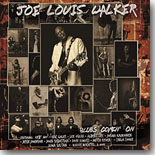 We audited the Joe Louis Walker
tracks from his latest album, Blues Comin' On
(Cleopatra Blues), “Feed the Poor,” featuring Jorma Kaukonen, and “Old Time Used to Be,” with
Keb’ Mo’ not on vocal but as acoustic guitar
soloist. Add in old-timey piano and the disc is
a delight. We audited the Joe Louis Walker
tracks from his latest album, Blues Comin' On
(Cleopatra Blues), “Feed the Poor,” featuring Jorma Kaukonen, and “Old Time Used to Be,” with
Keb’ Mo’ not on vocal but as acoustic guitar
soloist. Add in old-timey piano and the disc is
a delight.
Guests on other tracks include fellow blues
icons Eric Gales, Albert Lee, Detroit soul
singer Mitch Ryder, and harmonica virtuoso Lee
Oskar. The release shuffles and swings along
nicely, music business seasoning is obvious
throughout. Walker’s trademark vocal stands out,
but sometimes I can’t tell which guitar is his
what with all the guests.
Add
up the tracks to equal good grooves, this is a
satisfying happy medium between commercial
potential and contemporary blues.
--- Tom Coulson
Leader / frontman / stand-alone vocalist
Gerald McClendon offers more than medium
heat soul on Can't Nobody Stop Me Now
(Delta Roots Records). In a good-memory way his
music woulda been great alongside the Top 40 and
Motown I heard on AM radio as a kid. We like “I
Started Over,” and also recommend the track “You
Can’t Take my Love.” which, with its horns,
hints at the Memphis sound.
--- Tom Coulson
Gregg Martinez has released a single only,
not yet associated with an album. It’s an
easy-going ballad w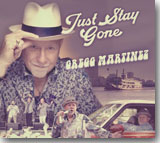 ith sufficiently heavy vocal
delivery and very competent musicians. “Just
Stay Gone” reminds me never to judge a book by
its cover! ith sufficiently heavy vocal
delivery and very competent musicians. “Just
Stay Gone” reminds me never to judge a book by
its cover!
--- Tom Coulson
Jose Ramirez fronts a pretty good band on
self-released Here I Come, his vocal is
medium-duty on titles like the shuffle “Stop
Teasing Me” and the minor key steady tempo of
“One Woman Man.” His guitar sounds BB-King
influenced in places, and an attention-grabbing
pianist plays discordant in the right spots
without showing off, the way too many blues-rock
keyboard players do. For slow blues may we
suggest “Goodbye Letter.”
--- Tom Coulson
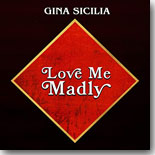 Gina Sicilia classifies herself a song and
music writer. A Newtown, Pennsylvania-native,
Gina now calls Nashville home. Her new album is
Love Me Madly (Blue Elan). Gina Sicilia classifies herself a song and
music writer. A Newtown, Pennsylvania-native,
Gina now calls Nashville home. Her new album is
Love Me Madly (Blue Elan).
My
first impression of Gina Sicilia was a
promotional YouTube promoting one of her
appearances some time back, I didn’t care for
that, and I didn’t care for this new album upon
first play either. Three reasons: first, her
vocals sound cold, her pitch a little off (which
I have no doubt is an acquired taste like with
many vocalists’ first impression). I do however
always want to give singers the benefit of a
doubt, a bit more of a chance.
Another reason is the “country garage” (as
opposed to a blues/rock garage band) sound of
her backing musicians, which I would expect to
have considerable collective experience. Let us
say not a “crack” Nashville rhythm section.
The
third reason is the over-produced audio of the
album. In its defense, the release doesn’t
purport to be blues. I focused on the title
track, “Love Me Madly,” as well as the
concluding track, “Answer the Phone.” To her
credit as a writer, Sicilia’s lyrical content is
good. And I’ll be darned if her music doesn’t
stay in my head quite a while after hearing it.
So why be a critic instead of the public or a
listener.
--- Tom Coulson
I play what I review on the radio
http://fullmoonhacksaw.com
Broadcaster-Musician
Facebook, Twitter
tomcoulson@fullmoonhacksaw.com
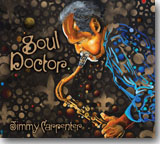 Sax
man extraordinaire Jimmy Carpenter has
been a part of the music world for over 35
years, breaking in with The Alka-Phonics in the
’80s and The Believers in the ’90s. He’s toured
with Tinsley Ellis, Walter “Wolfman” Washington,
Eric Lindell, Jimmy Thackery, and others. He
also serves as musical director for the Big
Blues Bender, leading the Bender Brass, the
Bender’s house band. Since 2012, Carpenter has
recorded and toured with Mike Zito and the
Wheel, and now he has released Soul Doctor,
recorded on Zito’s and Guy Hale’s Gulfcoast
Records label. Sax
man extraordinaire Jimmy Carpenter has
been a part of the music world for over 35
years, breaking in with The Alka-Phonics in the
’80s and The Believers in the ’90s. He’s toured
with Tinsley Ellis, Walter “Wolfman” Washington,
Eric Lindell, Jimmy Thackery, and others. He
also serves as musical director for the Big
Blues Bender, leading the Bender Brass, the
Bender’s house band. Since 2012, Carpenter has
recorded and toured with Mike Zito and the
Wheel, and now he has released Soul Doctor,
recorded on Zito’s and Guy Hale’s Gulfcoast
Records label.
Soul Doctor offers ten tracks, seven written
by Carpenter or co-written with Hale, and three
tasty covers. The catchy title track opens the
disc, a blistering combination of blues, rock,
and soul with guitarist Nick Schnebelen sitting
in – his fretwork and Carpenter’s saxophone
complement each other well. Memphis soul burner
“When I Met You” follows; originally conceived
as a country tune, Carpenter’s arrangement shows
the line between country and soul is a thin one.
“Wild Streak” is a gritty blues shuffle about a
girl with big dreams, and the funky “Love It So
Much” features that irresistible New Orleans
second line groove.
The
album’s first cover is Little Willie John’s
“Need Your Love So Bad,” and Carpenter does a
fine job on the vocal, along with a great sax
solo. The sage “Wanna Be Right” offers sound
advice to those who always have to have the last
word. The Coasters’ “One Mint Julep” was a song
Carpenter performed frequently with Washington
and that tune gets a deliciously funky treatment
that will warrant a replay or two. On the fierce
southern rocker, “Wrong Turn,” Carpenter picks
up the guitar with satisfying results, teaming
with slide guitarist Trevor Johnson.
The
instrumental “LoFi Roulette” is marvelous, a
thoroughly modern musical take that blends
blues, funk and jazz with nice solos from
Carpenter and Johnson, plus exquisite work on
the keys from Red Young. Eddie Hinton’s “Yeah
Man” gets an optimistic reading from Carpenter
and closes the album on a positive note.
Actually, the upbeat Soul Doctor is
loaded with positive notes. Spin this disc when
you need a hop in your step or a kick in your
pants. Jimmy Carpenter has the cure for what’s
ailing you.
--- Graham Clarke
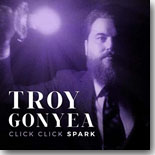 Guitarist Troy Gonyea has been playing
for 25 years, backing a host of the blues’ best
over that time with The Muddy Waters Blues Band,
Booker T. Jones, The Fabulous Thunderbirds,
Anthony Geraci, Sugar Ray & the Bluetones, and
many others. During that time, Gonyea has also
managed to carve out a solo career, earning a
strong reputation as a songwriter, singer, and
guitarist. His skills are on full display with
his recent live album, Click Click Spark
(Lotus Eater Records), recorded in Worcester,
Massachusetts in June of 2018. Guitarist Troy Gonyea has been playing
for 25 years, backing a host of the blues’ best
over that time with The Muddy Waters Blues Band,
Booker T. Jones, The Fabulous Thunderbirds,
Anthony Geraci, Sugar Ray & the Bluetones, and
many others. During that time, Gonyea has also
managed to carve out a solo career, earning a
strong reputation as a songwriter, singer, and
guitarist. His skills are on full display with
his recent live album, Click Click Spark
(Lotus Eater Records), recorded in Worcester,
Massachusetts in June of 2018.
Gonyea is backed by Marty Ballou (bass), Marty
Richards (drums), and Brooks Milgate (keys) on
this nine-song set, which spans blues, soul, and
rock ‘n’ roll. Rock ‘n’ roll launches the disc
in a big way with the Chuck Berry-esque Gonyea
original “(Do The) Curl Up And Die,” and the
blues take center stage with a smoking hot take
on Magic Sam’s “That’s Why I’m Crying.” Gonyea
turns in a powerful vocal on the rock and soul
ballad, “As I Am,” and picks up the harmonica
for the dynamite Willie Dixon (via Sonny Boy
Williamson II) cover “Bring It On Home.”
The
traditional gospel tune, “Tell Heaven,” is a
nine-minute slow blues stunner with an extended
slide guitar solo. It’s followed by Jimmy
McCracklin’s “Georgia Slop,” a torrid mix of R&B
and rock ‘n’ roll, and another splendid slow
burner, Duster Bennett’s “Jumping At Shadows.”
Gonyea’s soulful vocal is top notch on this
track and there’s plenty of fine guitar work
here, too. The disc closes with a fun version of
the boogie classic “I Am Feeling So Good.”
The
best live discs either make the listener feel
that they were there or it makes them wish that
they had been there. The performance on Click
Click Spark meets those qualifications. Troy
Gonyea gives a marvelous performance on these
tracks, making the traditional blues tunes seem
contemporary and also shows himself to be a
impressive songwriter as well. Hopefully, he’ll
find his way to the studio soon.
--- Graham Clarke
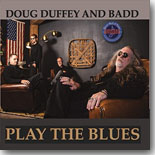 Doug
Duffey got his start as a performer at a young
age, performing and composing at the age of 14.
He recorded his first single in 1970. and has
written songs and recorded with a prestigious
group of artists that include George Clinton,
Bootsy Collins, Rare Earth, Keith Richards,
Herbie Hancock, Bernie Worrell, David Byrne,
Maceo Parker, Marcia Ball, John Autin, and many
others. He was inducted into the Louisiana Hall
of Fame in 2001 and the National Blues Hall of
Fame in 2009. In recent years, he has recorded
with guitarist Dan Sumner, bassist Ben Ford, and
drummer Adam Ryland as Doug Duffey and BADD
(Ben, Adam, Dan, and Doug). Doug
Duffey got his start as a performer at a young
age, performing and composing at the age of 14.
He recorded his first single in 1970. and has
written songs and recorded with a prestigious
group of artists that include George Clinton,
Bootsy Collins, Rare Earth, Keith Richards,
Herbie Hancock, Bernie Worrell, David Byrne,
Maceo Parker, Marcia Ball, John Autin, and many
others. He was inducted into the Louisiana Hall
of Fame in 2001 and the National Blues Hall of
Fame in 2009. In recent years, he has recorded
with guitarist Dan Sumner, bassist Ben Ford, and
drummer Adam Ryland as Doug Duffey and BADD
(Ben, Adam, Dan, and Doug).
The
band’s second release, Play The Blues
(Out of The Past Music), is a dazzling set of
southern blues and soul that has deep roots in
Memphis, Louisiana, and Mississippi. It features
nine original tunes from Duffey and Sumner,
including the opening shuffle, “The Things We
Used To Do,” a unique variation of sorts to the
classic Guitar Slim tune of the ’50s that
features an awesome guitar break from Sumner.
“Evil” is funky, sweaty R&B and “Big Easy Street
Blues” is a relaxed ballad with superb piano
from Duffey and sweet, stinging fretwork from
Sumner.
The
rollicking “Have You Ever” serves as a tribute
to New Orleans piano stalwarts like Professor
Longhair and Dr. John, and “Drink It On Down” is
a swampy blues rocker, while “My Driving Wheel”
is an anxious, world weary look at the modern
state of affairs. “Talk Of The Town” is a wry
look at nosy neighbors interfering with a covert
love affair, and “You Got That Somethin’” sings
the praises of one’s special someone. The album
closer, “A Memory Left To Lose,” is a sparse,
soulful ballad that wraps the set up nicely.
Duffey’s vocals and keyboard work are sublime
and he is well-complemented by Sumner’s
versatile guitar. Ryland and Ford provide
stellar rhythm support on these excellent set of
original songs. Play The Blues will
certainly satisfy any fan of southern music.
--- Graham Clarke
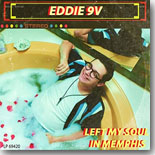 About a year ago, I gave a sneak preview of an
upcoming release from a young Atlanta musician
named Brooks Mason. Recording as Eddie 9V, he
recorded his first blues album at his house,
playing all of the instruments, except keyboards
(courtesy of Rhett Huffman). The completed set,
called Left My Soul In Memphis, is very
impressive with Eddie 9V showing a real knack
for both traditional and contemporary blues, a
blistering guitar attack, and a soulful set of
pipes. About a year ago, I gave a sneak preview of an
upcoming release from a young Atlanta musician
named Brooks Mason. Recording as Eddie 9V, he
recorded his first blues album at his house,
playing all of the instruments, except keyboards
(courtesy of Rhett Huffman). The completed set,
called Left My Soul In Memphis, is very
impressive with Eddie 9V showing a real knack
for both traditional and contemporary blues, a
blistering guitar attack, and a soulful set of
pipes.
The set consists of 11 tracks, split between
originals and covers. The opener, “Yonders
Wall,” is as solid a version as I’ve heard. The
title track is gritty, greasy blues in the Bluff
City tradition, and on “Bottle and the Blues,” a
fine slow urban blues, it sounds like Freddie
King bending strings. The funky “New Orleans”
has a swampy feel, and the outstanding instrumental, “Bending With The Kings,” manages to
pay tribute to all three Kings of the blues,
while “Woke Up Sweatin’” is an upbeat,
enthusiastic blues rocker.
The horn-fueled “36th & Main” ventures to the
Windy City with some scorching guitar licks, and
the deltafied “Ghosts” rolls slow and easy with
crisp guitar breaks between each line. “Lo-Fi
Love” is a really cool soul-blues track with
shimmering guitar and a supremely soulful vocal
turn from Eddie 9V, and “Don’t Test Me” combines
soul, funk, and the blues with dynamite results.
The closer, “1945 (Cocaine and Rum),” is a North
Mississippi blues/boogie romp, so Eddie 9V is
adept at that brand of blues, too.
The set has a sort of homemade feel (which makes
sense, being crafted at his house), making
it even more endearing because the music is so
good. Blues fans will want to track down Left My
Soul In Memphis for sure, and keep their eyes
and ears out for Eddie 9V because there is
surely more to come from this immensely talented
young man.
--- Graham Clarke
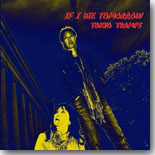 The Tokyo Tramps are Satoru Nakagawa
(guitar/vocals) and Yukiko Fujii (bass/vocals).
The Boston-based husband and wife team both hail
from Japan, but both were American music
fanatics and left their homeland to play
American music, falling in love with the blues
in the process. Their musical approach is modern
and high energy, blending blues, rock, New
Orleans funk (Nakagawa spent years in Louisiana
before moving north, where he met and married
Fujii), and soul. If I Die Tomorrow (Vagabond
Entertainment) is their seventh album in a 20
year career. The Tokyo Tramps are Satoru Nakagawa
(guitar/vocals) and Yukiko Fujii (bass/vocals).
The Boston-based husband and wife team both hail
from Japan, but both were American music
fanatics and left their homeland to play
American music, falling in love with the blues
in the process. Their musical approach is modern
and high energy, blending blues, rock, New
Orleans funk (Nakagawa spent years in Louisiana
before moving north, where he met and married
Fujii), and soul. If I Die Tomorrow (Vagabond
Entertainment) is their seventh album in a 20
year career.
The opening track, “Flowing Water,” is searing
rock and funk. The title track follows, a swampy
blues that’s equal parts Muddy Waters and Jimi
Hendrix, and “Why” (sung by Fujii) has an
irresistible rock and soul rhythm. “Woman” is a
slow burner with a fine vocal and sharp guitar
work from Nakagawa, and on the hard rocker
“Bluebird,” the volume goes to ten, while “Misty
Forest” is an almost-psychedelic instrumental
with edgy guitar from Nakagawa.
On the seriously funky “Betty’s Kitchen,”
Nakagawa discusses the beginnings of his love
affair with the blues from his time in New
Orleans, and the haunting mid-tempo “Talking To
Someone” tackles the subject of loneliness,
while the riff-driven “Mystery Man” is hard
charging funk. “Reprobates, Tramps, and Saints,”
an entertaining story about what must have been
some kind of party, features raw slide guitar
from Nakagawa, and “Lovin’ Man” is a sweet and
gentle ballad about a man falling in love for
the first time.
A pair of excellent bonus tracks complete the
package. “Winter Always Turns To Spring” is an
old school blues that has a bit of a North
Mississippi Allstars feel, and the lively “Blues
In My Blood” features splendid, soaring slide
guitar from Nakagawa.
Nakagawa is a masterful guitarist in a variety
of styles and he and Fujii really shine
vocally, whether individually or in harmony. If I
Die Tomorrow is a powerful and diverse set of
modern blues that also embraces rock and funk.
It’s a most delicious blend, for sure.
--- Graham Clarke
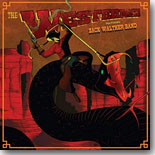 The Texas-based
Zack Walther Band is equally
comfortable playing blues, country, rock, or
R&B, as can be readily heard on the band’s
latest effort, The Westerner, a rock solid
ten-song set of nine Americana, blues and
country originals, plus one cover. Walther
handle all the vocals and guitar work, and he’s
backed by Matthew Briggs
(drums/guitar/bass/vocals) and Mike Atkins
(keyboards/bass/vocals), along with guest
artists David Grissom (guitars), Jeff Plankenhorn (lap steel), Susan Gibson (vocals),
Mark L. Wilson (sax), D. Tiger Anaya (trumpet),
and Tyler Cannon (bass). The Texas-based
Zack Walther Band is equally
comfortable playing blues, country, rock, or
R&B, as can be readily heard on the band’s
latest effort, The Westerner, a rock solid
ten-song set of nine Americana, blues and
country originals, plus one cover. Walther
handle all the vocals and guitar work, and he’s
backed by Matthew Briggs
(drums/guitar/bass/vocals) and Mike Atkins
(keyboards/bass/vocals), along with guest
artists David Grissom (guitars), Jeff Plankenhorn (lap steel), Susan Gibson (vocals),
Mark L. Wilson (sax), D. Tiger Anaya (trumpet),
and Tyler Cannon (bass).
The opener, “DFW,” deftly mixes blues, rock and
country with a little shot of soul for good
measure. “What Kind Of Man” was inspired by Otis
Redding’s “These Arms Of Mine,” according to
Walther, whose vocal is blues-soaked with rock
guitar backing. The excellent “Payin’ For It
Now” is a tale of misspent youth that will find
listeners nodding their heads in agreement, and
the funky “I’m Going Out Of Your Mind” is a
break-up song with a twist (nice lap steel from
Plankenhorn on this one), while the horn-driven
“When The Show Comes To Town” is a song about
the circus.
“Bad
Girl” and “Casualty” are both blues rockers, the
former is more upbeat with a bit of a pop
flavor, while the latter is taken at a slower,
more intense pace. “Meet In The Middle,” a
catchy duet with Gibson, combines soul and pop.
“Bailey’s Light,” the cool album closer,
features gospel-flavored group vocals and a countrified melody. Walther and
company also cover Sam & Dave’s “Hold On, I’m
Comin’,” with the combination of Walther’s
enthusiastic vocal, spirited harmonica work, and
horns making this version a memorable one.
Walther’s powerful vocals move seamlessly from
blues to soul to country. His muscular guitar
work and sharp songwriting are first-rate. He
receives superb support from his band and the
guest artists. The Westerner should satisfy any
music lover who digs blues, country, or rock.
--- Graham Clarke
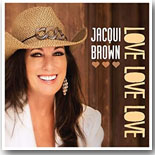 Jacqui Brown has a résumé that most people would
die for. A fashion model in her early twenties,
she’s been married to two-time
Grammy winning guitarist/producer Paul Brown for
over 40 years (we reviewed his Dusty Road album
with Brothers Brown several years ago). In her
40s she got a journalism degree and worked at
the Los Angeles Times, going on to write 25
books. She also started careers as a life coach
and as a stand-up comic. Brown recently began to
pursue a career in music, writing a song for an
addicted child called “Somebody’s Child,” which
blew her husband away, considering that he had never even heard her
sing. Jacqui Brown has a résumé that most people would
die for. A fashion model in her early twenties,
she’s been married to two-time
Grammy winning guitarist/producer Paul Brown for
over 40 years (we reviewed his Dusty Road album
with Brothers Brown several years ago). In her
40s she got a journalism degree and worked at
the Los Angeles Times, going on to write 25
books. She also started careers as a life coach
and as a stand-up comic. Brown recently began to
pursue a career in music, writing a song for an
addicted child called “Somebody’s Child,” which
blew her husband away, considering that he had never even heard her
sing.
With help from her husband,
Ms. Brown began to
write songs with the result being her first album,
Love Love Love (Woodward Avenue Records). The
Browns co-wrote all 11 songs and Paul Brown
played guitar on all tracks, also producing and
mixing the album. They are joined by drummer
Tony Braunagel, bassist Bob Glaub, drummer Lew
Laing, and keyboardist Brother Paul Brown, with
guests Candy Girard (violin), Kenny Gradney
(bass), and Mike Finnigan (keys). The album
leans more toward the Americana side of music,
but there are shades of blues, pop, country, and
jazz heard throughout.
The presence of Girard’s violin on several
tracks --- the jaunty “Bend” and “Lovin’ You," the
splendid ballad “You Had Me At Hello,” and the
reflective “Nothin’s Like It Seems” --- gives those
tracks more of a country feel, and they are
solid tunes. The Browns team up on vocals on the
soulful title track. Her vulnerable vocals really
sells the heartrending “Why Oh Why,” but she
sounds like a woman determined to rise again on
“Brought The House Down,” a strong mid-tempo
blues. The somber “Cry Over You” and “Wait” both
combine country and soul, while “Flow Like A
River” is a smooth shuffle. The aforementioned
“Somebody’s Child,” which was written for the
Brown’s daughter Sarah, closes the disc.
Jacqui Brown proves to be a gifted songwriter
and a great singer in a variety of genres on
Love Love Love. Hopefully, this debut release
will lead to more releases soon because she
sounds like a woman with a lot to say.
--- Graham Clarke
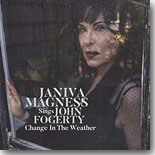 A few weeks back, I picked up a copy of
Creedence Clearwater Revival’s Chronicle. I had
a cassette copy when I was in college that I
played until it made that squeaking sound
cassettes used to make. Not long after that,
famed CCR front man John Fogerty resurfaced with
his Centerfield album, which I played to death
as well. In the late ’90s, his Blue Moon Swamp
was one of my favorites as well, so yeah, you
might say I dig his music. Well, so does Janiva
Magness, one of my favorite singers, and she
recently paid tribute to the rock ‘n’ roll
legend with the exhilarating Janiva Magness
Sings John Fogerty: Change In The Weather (Blue
Élan Music). A few weeks back, I picked up a copy of
Creedence Clearwater Revival’s Chronicle. I had
a cassette copy when I was in college that I
played until it made that squeaking sound
cassettes used to make. Not long after that,
famed CCR front man John Fogerty resurfaced with
his Centerfield album, which I played to death
as well. In the late ’90s, his Blue Moon Swamp
was one of my favorites as well, so yeah, you
might say I dig his music. Well, so does Janiva
Magness, one of my favorite singers, and she
recently paid tribute to the rock ‘n’ roll
legend with the exhilarating Janiva Magness
Sings John Fogerty: Change In The Weather (Blue
Élan Music).
Magness and producer/guitarist Dave Darling
picked a dozen of Fogerty’s songs, six from his
CCR years and six from his solo career. The CCR
songs include “Lodi,” which teams Magness with
country singer Sam Morrow for a nice slice of
countrified soul, and the reflective “Someday
Never Comes.” “Have You Ever Seen The Rain” gets
a makeover as Magness slowed the tempo to a
crawl, giving her vocals even more power.
“Bad Moon Rising” receives a slide guitar-driven
swamp rocker treatment, and “Fortunate Son”
retains the original’s hard rocking intensity.
“Looking Out My Back Door” closes the album,
taking a slightly more country bent but
retaining the cheerful charm of the original.
The title track, one of the better tracks from
Fogerty’s Eye of the Zombie album, gets an
upbeat percussion-driven treatment. Magness does
an excellent job with “Wrote A Song For
Everyone,” from Fogerty’s 2013 album of the same
title, and Taj Mahal joins her on vocals
(bringing along his banjo) for an inspired
reading of “Don’t You Wish It Was True.”
“Blueboy” was one of the standout tracks on Blue
Moon Swamp, with Magness’s version retaining the
swampy flair of the original. Her understated
but soulful read of “Déjá Vu (All Over Again)”
is perfect, and gives a positively steamy
interpretation of “A Hundred And Ten In The
Shade.”
John Fogerty’s music has always incorporated the
gamut of American music, mixing blues, soul,
rock ‘n’ roll, and country effortlessly into a
mix that’s commonly referred to as “Americana”
these days. It makes perfect sense for a modern
artist to pay tribute to his body of work.
Fortunately, we have an artist as talented as
Janiva Magness who rose to the occasion with
Change In The Weather. Maybe one day, the two of
them can collaborate on a few songs themselves.
--- Graham Clarke
 Billy Price first earned recognition as singer
for guitarist Roy Buchanan, appearing on two
Buchanan albums in three years. Since going
solo, he has amassed a most impressive catalog,
with 17 albums, CDs, and DVDs. His collaboration
with Otis Clay, This Time For Real, earned a BMA
in 2015 for Best Soul Blues Album, and his 2018
effort, Reckoning, was nominated in the same
category. Recently, Price signed with Mike Zito
and Guy Hale’s Gulf Coast Records label, with his
debut, Dog Eat Dog, which was nominated in 2019
for the Soul Blues BMA, ranking with the best
releases of 2019. Billy Price first earned recognition as singer
for guitarist Roy Buchanan, appearing on two
Buchanan albums in three years. Since going
solo, he has amassed a most impressive catalog,
with 17 albums, CDs, and DVDs. His collaboration
with Otis Clay, This Time For Real, earned a BMA
in 2015 for Best Soul Blues Album, and his 2018
effort, Reckoning, was nominated in the same
category. Recently, Price signed with Mike Zito
and Guy Hale’s Gulf Coast Records label, with his
debut, Dog Eat Dog, which was nominated in 2019
for the Soul Blues BMA, ranking with the best
releases of 2019.
Co-produced by Price and Kid Andersen and
recorded at Greaseland Studios, Dog Eat Dog
features a dozen tracks, seven originals
co-written by Price (with Hale, longtime
collaborator Jim Britton, Fred Chapéllier, or
Bill Troiani), along with tracks written by
Britton, Rick Estrin (and Alabama Mike), Melvin
and Mervin Steals, Bobby Byrd, and Willie Dixon.
The album smoothly blends blues and soul, requisite for any Billy Price release, along
with R&B, a little reggae, and a dash of jazz to
make things interesting.
The opener, “Working On Your Chain Gang,” really
gets the disc off to a great start, with punchy
horns from Eric Spaulding – tenor sax, John Halblieb – trumpet, and Jack Sanford – baritone
sax, entertaining lyrics, and “chain gang”
backing vocals from the Sons of The Soul
Revivers (Walter, James, and Dwayne Morgan).
“Lose My Number” is a cool soul burner
punctuated by Jimmy Pugh’s keyboards and a
terrific sax solo from Spaulding, while Byrd’s
“We’re In Love” packs plenty of Memphis grease
in its grooves. Meanwhile, the tough title track
is from Estrin with added lyrics from Alabama
Mike (both of whom contribute to the track,
Estrin on harmonica and Mike on vocals).
Price pulls out all the stops on a raw and
powerful take of Willie Dixon’s “My Love Will
Never Die,” nearly topping the Otis Rush/Cobra
version (a high bar, for sure), and “All Night
Long Café” is a contemporary track that
marries blues, funk, and reggae (nice guitar
work from Zito on this one). The energetic “Walk
Back In” mixes soul and R&B with
gospel-influenced vocals from the Sons of Soul
Revivers, and the funky, horn-fueled “Toxicity”
is a standout, while “Remnants” tells the sordid
tale of a cheating woman (Kid Andersen’s guitar
work is other-worldly).
The Steals Brothers, who wrote the Spinners’
“Could It Be I’m Falling In Love,” penned “Same
Old Heartaches,” and Price gives it a real
Philly soul spin with backing vocal help from
the Sons. The ballad “More Than I Needed” sounds
like vintage ’70s R&B with Andersen’s Moog
synthesizers and sweet backing vocals from Lisa Leuschner Andersen and Vicki Randle.
The
closer, “You Gotta Leave,” takes an edgy tone as
Price tells his significant other to hit the
road.
Dog Eat Dog was one of my favorite releases of
2019. The combination of blues, soul, and
’70s-era R&B really hit me where I live. If
you’re fans of those genres then it should do the
same for you, but like any Billy Price release
it definitely deserves to be heard by any blues
and soul lover.
--- Graham Clarke
|